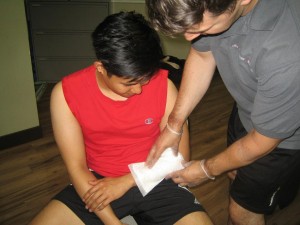Anyone who has been bitten by a cat can confirm the pain that it causes. Always remember that cats have small, pointed teeth that can puncture the skin easily. Cat bites on the hand are quite common since a scared or aggressive cat can bite as it is being stroked or picked up. Always remember that cat bites must be taken seriously since infection can likely occur and in rare cases, can be life-threatening.
First aid for a cat bite
You have to perform the following first aid measures on cat bites.

- You have to wash the area right away using warm water and soap. It is best to use an antibacterial soap since it will effectively remove saliva and dirt that might be present in the wound. Wash the area for several minutes, making sure that you will scrub the area thoroughly. Rinse carefully until all the soap is removed.
- Pour an antiseptic solution such as hydrogen peroxide or iodine over the bite site on the hand.
- You have to apply firm pressure to the bite site using a clean cloth, towel or gauze to stop the bleeding.
- Apply an antibiotic cream or ointment on the wound and cover using a sterile bandage to prevent further irritation as well as preventing entry of dirt and debris that can cause infection.
- The hand that sustained the cat bite must be elevated higher than the level of the heart. This will help control the swelling and prevent infection.
You have to consult a doctor if the cat that bit the hand is not yours. You have to find out if the cat has updated shots, especially rabies. If you happen to know who the owner is, ask for the cat’s shot history. In case the cat is a stray, you have to get in touch with the local animal control so that they can locate the cat to test it for rabies. If the cat could not be found, the doctor might recommend a series of rabies shots.
Important tips to bear in mind
If there are children in the house, do not leave them alone with a cat in order to avoid cat bites. Do not pick up stray or unfamiliar cats in the neighborhood since that cat might have rabies.
When animals are fighting, such as dogs and cats, do not get in between them since you are at risk for getting a bite whether from the dog or cat.
Individuals who have certain medical conditions such as HIV, circulatory problems or had their spleens removed are considered at high risk for developing a severe infection from even minor cat bites. If the individual is included among these high risk groups, it is important to seek medical help once he/she has been bitten.
